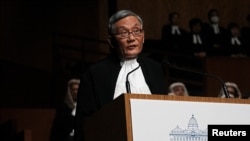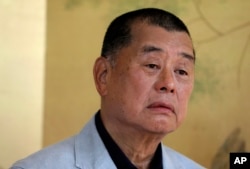As Hong Kong’s official legal year began Monday, the city’s chief justice, Andrew Cheung, used the opportunity to stress how the judiciary takes its duty seriously.
The courts will not “blindly convict” anyone and will respect fundamental rights in national security cases, Cheung said at the official ceremony, adding that the justice system will also not bow to pressure.
"Threats of sanction or reprisal against judges for simply discharging their judicial duties are, therefore, repugnant to the rule of law and fundamentally objectionable,” said Cheung.
The chief justice’s comments come as U.N. experts have added their voices to those calling on Hong Kong to drop all charges against pro-democracy publisher Jimmy Lai.
Lai is one month into his trial on charges of sedition and collusion with foreign forces, under Hong Kong’s national security law. The 76-year-old publisher denies the charges, but if convicted could face life in prison.
In a statement released Monday, four United Nations experts called for Hong Kong to drop the case against Lai.
The British national, who founded the pro-democracy newspaper Apple Daily, has been in custody since his arrest in 2020. His news outlet later shuttered after the arrests of senior executives and freezing of assets.
Prosecutors in the case have described Lai as a “radical” whom they say was at the center of conspiracies to collude with foreign forces and publish seditious material in Apple Daily.
The prosecutors alleged that Lai used "the guise of fighting for freedom and democracy" to request that foreign countries, including the U.S., impose sanctions and other hostile activities against Hong Kong and China.
Cited as evidence was a meeting between Lai and then-U.S. Vice President Mike Pence and Secretary of State Mike Pompeo in Washington in July 2019.
The meeting included a discussion of an extradition bill that would have allowed people in Hong Kong to be sent to China to face trial. After mass protests, the proposed extradition bill was withdrawn.
Prosecutors also cited 161 articles in Apple Daily as evidence of sedition and said Lai instructed Apple Daily to introduce English content to bolster support for Western governments sanctioning China and Hong Kong.
Lai denies all charges.
The case against Lai appears “directly related to his criticism of the Chinese government and his support for democracy in Hong Kong,” said the U.N. experts, who are part of the U.N. Special Procedures of the Human Rights Council.
The experts include Irene Khan, the special rapporteur on freedom of expression; Clement Nyaletsossi Voule, special rapporteur on the rights of freedom of peaceful assembly; Alice Jill Edwards, special rapporteur on torture; and Margaret Satterthwaite, special rapporteur on independence of judges and lawyers.
The council reiterated its concerns about Hong Kong’s national security law, which they said is not in line with international obligations.
Lai’s trial is the second under the national security law after a case involving 47 pro-democracy activists who are awaiting a verdict, the U.N. said.
“We reiterate that national security legislation with criminal sanctions should never be misused against those exercising their rights to freedom of expression and association and of peaceful assembly, nor to deprive such persons of their personal liberty through arrest and detention,” the U.N. experts said.
Hong Kong has pushed back against criticism that the law is affecting press freedom; Hong Kong's former chief executive Carrie Lam previously said the Apple Daily case was about "a suspicious act of endangering national security," not media freedom.
Lai’s case is seen by media freedom advocates as a test of Hong Kong’s commitment to a free press.
The New York-based Committee to Protect Journalists, or CPJ, has identified China as a leading jailer of journalists, with 44 behind bars, and said Beijing’s influence is being seen in Hong Kong.
“What we’ve seen in recent years is that Hong Kong has followed Beijing’s very harsh national security law, to crack down on those seen as pro-democracy, including journalists speaking truth to power,” said CPJ chief executive Jodie Ginsberg.
“Lai’s case is an incredibly powerful and important test of Hong Kong’s commitment to a free press,” Ginsberg said. “It’s really, really important that we see the international community speak out in support of Jimmy Lai, in support of a free press.”
U.S. and British officials have condemned the case against Lai. At least 15 witnesses are expected to be called at the trial, which is scheduled to last between eight and 10 weeks.
Some information in this article came from Reuters.







